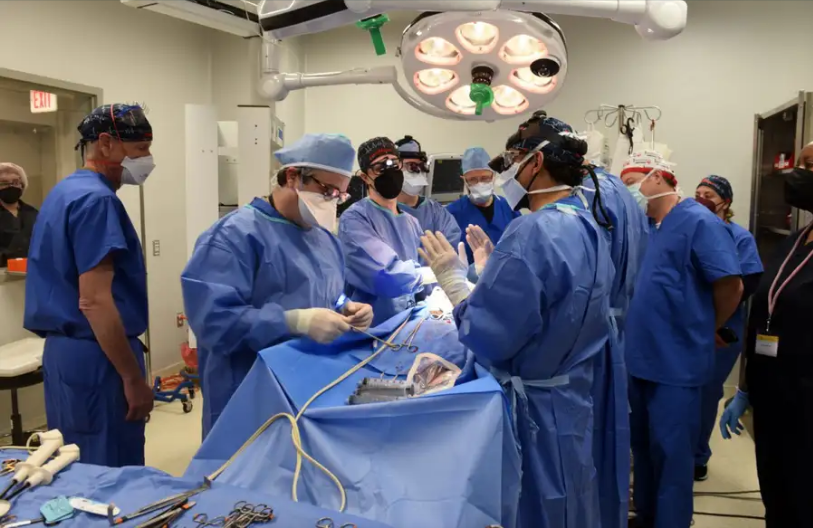
Second person to receive pig heart transplant dies
Second person to receive pig heart transplant dies. It was reported by his Maryland physicians on Tuesday that the second person to get a transplanted heart from a pig had passed away, almost six weeks after the highly experimental procedure.
When Lawrence Faucette, 58, received the genetically altered pig heart on September 20, he was near death from heart failure and was not qualified for a conventional heart transplant.
The heart had appeared healthy for the first month, but in the last few days, rejection symptoms started to appear, according to the University of Maryland School of Medicine. Faucette departed on Monday.
Ann Faucette’s husband “knew his time with us was short and this was his last chance to do for others,” according to a statement the hospital posted. He had no idea that he would live for so long.”
2. Maryland researchers successfully transplanted (Second person to receive pig heart transplant dies)
The Maryland researchers successfully transplanted a genetically modified pig’s heart into a dying man last year, setting a record for the globe. Although the exact cause of David Bennett’s heart failure is unknown, he lived for two months before it collapsed. Later, traces of a pig virus were discovered inside the organ. Before the second trial, improvements were made based on the lessons learned from the previous one, such as improved virus testing.
The surgeon who oversaw the transplant at the University of Maryland Medical Center, Dr. Bartley Griffith, stated in a statement that “Mr.Faucette’s last wish was for us to make the most of what we have learned from our experience.”
For many years, attempts to transplant organs from animals to humans, or “xenotransplants,” have been unsuccessful since the recipient’s immune system rejected the alien tissue right away. Currently, researchers are attempting once more to create more human-like organs in pigs through genetic modification.

Second person to receive pig heart transplant dies
Out of choices and wanting to spend a little more time with his family, Faucette, a father of two from Frederick, Maryland, a Navy veteran, went to the Maryland hospital after being denied a standard heart transplant due to other health issues.
The hospital said in mid-October that Faucette had regained his ability to stand, and they made available a video of him exerting himself greatly in physical therapy to obtain the power required to try walking again.
Leading expert in cardiac xenotransplantation, Dr. Muhammad Mohiuddin, stated that while the team continues researching pig organs, they will examine what transpired with the heart.
Many experts believe that in the far future, xenotransplants will be able to make up for the severe lack of human organ donors. A nation’s transplant waiting list is over 100,000, the majority of whom are in need of kidneys, and countless will perish in the process.
In an attempt to gather sufficient information for the Food and Drug Administration to approve official xenotransplant research, a few scientific teams have tested pig kidneys and hearts in monkeys and in human donor bodies.
- Read More about Matthew Perry’s death reason & Tyler Christopher
3. FAQ – Second person to receive pig heart transplant dies
Q1: How did Lawrence Faucette feel about the transplant?
A: Lawrence Faucette’s wife, Ann, mentioned that he knew his time was short and saw this as his last chance to help others. He didn’t expect to survive as long as he did.
Q2: What was the outcome of the world’s first pig heart transplant, performed last year?
A: The recipient of the world’s first pig heart transplant, David Bennett, survived for two months before the transplanted heart failed. The exact reasons for the failure were not entirely clear, but signs of a pig virus were found inside the organ.
Q3: What changes were made for the second pig heart transplant attempt?
A: Lessons from the first experiment led to changes in the second attempt, including better virus testing.

Q4: Why is the medical community interested in pig-to-human organ transplants?
A: Scientists are exploring pig-to-human organ transplants, known as xenotransplants, as a potential solution to address the shortage of human organ donations.
Q5: What were Lawrence Faucette’s circumstances that led him to seek this experimental procedure?
A: Lawrence Faucette, a Navy veteran and father of two from Frederick, Maryland, had been turned down for a traditional heart transplant due to other health problems. He turned to the pig heart transplant as a last resort to spend more time with his family.
Q6: What is the hope behind xenotransplants involving pig organs?
A: Scientists hope that xenotransplants using pig organs could help alleviate the shortage of human organ donations, which affects many people on transplant waiting lists.

